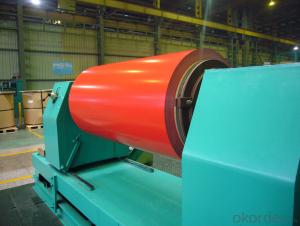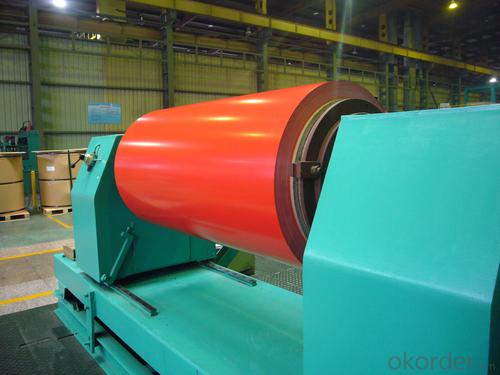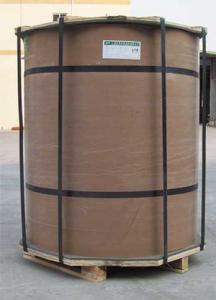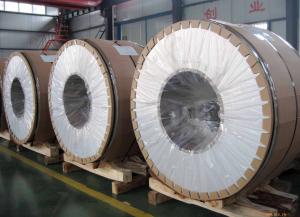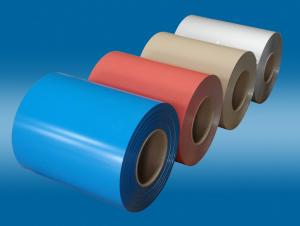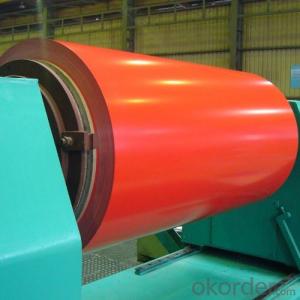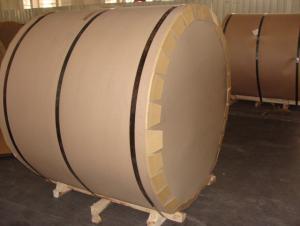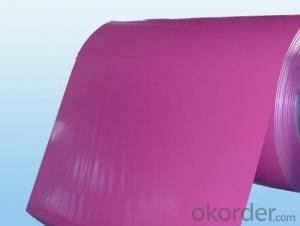PE Coated Gutter Aluminum Coil-3XXX
- Loading Port:
- China Main Port
- Payment Terms:
- TT OR LC
- Min Order Qty:
- -
- Supply Capability:
- -
OKorder Service Pledge
OKorder Financial Service
You Might Also Like
Product Description:
1 Specifications of PE Coated Aluminum Coil/Sheet
Alloy | AA1050,AA1060, AA1070, AA1100, AA3003, AA3004, AA3005, AA3105, AA5005, AA5052, AA5754, AA5083, AA8011 |
Temper: | H12, H14, H16, H18, H22, H24, H26, H32,HO, F |
Thickness: | 0.10-4.0mm |
Width: | 10mm- 2000mm |
Coating | PE(Polyester) |
Painting Thickness | Standard 16-25 microns, max 40 microns |
Color | Acording to Ral colors or customer’s samples |
Standard: | GB/T17748-1999, ASTM, ISO, EU standard |
Special Specification is available on customer’s requirement | |
PE(polyester) Coating
PE(polyester) coating:high molecular polymer as monomer and addition of alkyd, is an UV-resistant coating. It can be classified matt and glossy according to coating gloss. The compact molecule structure, makes paint surface luster and smooth,which assure good printing on the panel surface. With an warranty of 8-10 years for weather resistance, it is specially applied for internal decoration and sign board.
2 Usage/Applications of PE Coated Aluminum Coil/Sheet
Our company's PE Coated Aluminum Coil/Sheet have been widely used in the fields of construction and decoration(garage doors, ceiling etc.), electronic appliances, lighting decoration, air-condition air pipe, sanwich panels and drainage, etc.
- Q: Can aluminum coils be used for food processing conveyor systems?
- Aluminum coils are a viable option for food processing conveyor systems. The food processing industry favors aluminum for its advantageous properties. To begin with, aluminum's lightweight nature facilitates effortless installation and transport. This aspect proves especially valuable for conveyor systems that necessitate frequent reconfiguration or relocation. Moreover, aluminum exhibits exceptional resistance to corrosion, a pivotal attribute in food processing environments where exposure to moisture, chemicals, and food particles is prevalent. Additionally, aluminum's hygienic attributes make it easy to clean and maintain, ensuring adherence to food safety standards. Lastly, aluminum coils can be effortlessly molded and customized to meet the specific requirements of conveyor systems, thereby facilitating efficient and effective food processing operations. Consequently, aluminum coils emerge as a fitting choice for food processing conveyor systems.
- Q: why is aluminum oxide used more frequently than silicon carbide as an abrasive?What r the different types of tool feed mechanism in USM process.
- It may well be cheaper. Making silicon carbide is fairly energy intensive.
- Q: Hi, I have a large bag of aluminium sulfate that I would like to use to turn my hydrangeas blue but there are no instructions on the pack, can anyone tell me how much I need (mixed with water)
- I usually sprinkle about 1/4 cup around the base of the plant and water it in. This must be done before flowers appear.
- Q: What is the maximum yield strength of aluminum coils?
- The specific alloy and temper of aluminum significantly influence the maximum yield strength of aluminum coils. Typically, aluminum coils exhibit a yield strength between 10,000 and 40,000 psi. It must be emphasized that diverse properties and, consequently, varying maximum yield strengths are observed in different aluminum alloys and tempers. Furthermore, the thickness and width of aluminum coils have an impact on their maximum yield strength as well. Thus, to ascertain the precise maximum yield strength of aluminum coils, it is advisable to refer to the manufacturer's specifications or standards pertaining to the specific alloy and temper of the coils.
- Q: Can a digital caliper be utilized to accurately measure the diameter of an aluminum coil?
- <p>Yes, you can use a digital caliper to measure the diameter of an aluminum coil accurately. Digital calipers are precise measuring tools, often accurate to 0.001 inches or 0.02mm, which is suitable for measuring the diameter of various objects, including aluminum coils. Ensure the caliper is zeroed before use and that the coil's surface is clean and flat where the measurement is taken to get accurate readings.</p>
- Q: How do aluminum coils contribute to the aesthetics of a building?
- Aluminum coils can significantly contribute to the aesthetics of a building due to their versatility, durability, and aesthetic appeal. Firstly, aluminum coils can be easily shaped, cut, and formed into various architectural designs, allowing for greater flexibility in achieving the desired aesthetic of a building. Whether it is a sleek and modern look or a more traditional and ornate design, aluminum coils can be customized to meet the specific aesthetic requirements of a project. Additionally, aluminum coils come in a wide range of colors and finishes, enabling architects and designers to choose from a diverse palette to match the overall theme or style of a building. The option to select from different shades, textures, and patterns allows for endless possibilities in creating visually appealing facades and exteriors. Furthermore, aluminum is known for its durability and resistance to corrosion, making it an ideal material for architectural applications. The use of aluminum coils in a building ensures that the exterior surfaces will maintain their aesthetic appeal for an extended period, with minimal maintenance required. This durability makes aluminum coils a cost-effective choice for maintaining the aesthetics of a building in the long run. Moreover, aluminum coils can contribute to the energy efficiency of a building. They possess excellent thermal conductivity, allowing them to effectively dissipate heat and reduce the energy consumption required for temperature control. This energy-saving feature not only enhances the sustainability of a building but also adds to its overall aesthetic appeal by incorporating environmentally conscious design elements. In conclusion, aluminum coils contribute to the aesthetics of a building by providing flexibility in design, a wide range of color and finish options, durability, and energy efficiency. These qualities allow architects and designers to create visually appealing structures that align with the desired aesthetic vision while ensuring long-lasting beauty and sustainability.
- Q: What is the impact resistance of aluminum coils?
- The impact resistance of aluminum coils is generally high. Aluminum has a good strength-to-weight ratio and is known for its ability to withstand impact and deformation without breaking or fracturing easily. This makes aluminum coils suitable for various applications where resistance to impacts and mechanical stress is important, such as in construction, automotive, and aerospace industries.
- Q: How are aluminum coils used in the production of window frames?
- Due to its numerous benefits, aluminum coils are widely utilized in the manufacturing of window frames. These coils are typically fabricated from top-notch aluminum alloy, offering qualities such as strength, durability, and resistance to corrosion. To initiate the window frame production process, the aluminum coils are initially unrolled and cut into the desired lengths. These coils come in various thicknesses, enabling manufacturers to produce window frames of different sizes and specifications. Subsequently, specialized machines are employed to shape the aluminum coils into the required profiles. These profiles can be extruded, bent, or rolled into diverse forms, such as rectangular or curved, depending on the window frame design. This flexibility in shaping permits the creation of customized window frames that fulfill specific architectural requirements. Once the profiles are shaped, they are joined together using various techniques such as welding or mechanical fasteners. The lightweight nature of aluminum facilitates easy handling during the assembly process, leading to reduced production time and costs. Furthermore, the aluminum coils can be treated with different surface finishes, such as anodizing or powder coating, to enhance their appearance and provide additional protection against weathering and wear. These finishes also offer a wide array of color options, allowing window frame manufacturers to match the frames with the overall building design or the homeowner's preferences. The utilization of aluminum coils in window frame production brings forth several advantages. Aluminum is an exceedingly sustainable material as it can be recycled multiple times without compromising its properties. Additionally, its lightweight characteristic simplifies the installation process and lessens the burden on the structure. Moreover, aluminum exhibits excellent thermal conductivity, which aids in enhancing energy efficiency by minimizing heat transfer. In conclusion, aluminum coils play a vital role in the production of window frames. Their strength, durability, flexibility, and aesthetic options make them the preferred choice for manufacturers. Whether for residential or commercial applications, aluminum coils provide high-quality window frames that adhere to industry standards and elevate the overall appearance and performance of buildings.
- Q: Describe the manufacturing steps involved in producing aluminum coils.
- <p>The production processes of aluminum coils involve several key steps. Initially, aluminum ingots are melted in a furnace. The molten aluminum is then transferred to a casting machine where it is cast into a continuous strip. This strip is cooled and passed through a series of rollers to reduce its thickness and achieve the desired coil gauge. The rolling process can be hot or cold, depending on the final product's properties. After rolling, the aluminum coil may undergo annealing to improve its ductility and strength. It is then cleaned, oiled, and wound into coils. Quality control checks are performed throughout the process to ensure the coils meet specific standards. Finally, the aluminum coils are packaged and shipped for various applications such as construction, automotive, and packaging industries.</p>
- Q: What are the fire-resistant properties of aluminum coils?
- Due to its inherent characteristics as a metal, aluminum exhibits excellent fire-resistant qualities when formed into coils. With a melting point of 660 degrees Celsius (1220 degrees Fahrenheit), aluminum can endure high temperatures without melting, thereby making aluminum coils resistant to fire hazards. Furthermore, unlike certain other metals, aluminum does not produce flammable gases when exposed to fire. This non-combustible attribute prevents the fire from spreading and minimizes the potential for fire-related damages. Additionally, due to its low thermal conductivity, aluminum does not efficiently conduct heat. Consequently, aluminum coils do not facilitate the transfer of heat from one area to another, which aids in containing and controlling the fire's spread. Moreover, aluminum coils frequently undergo a protective coating process to enhance their fire resistance. These coatings, composed of materials like polyvinylidene fluoride (PVDF) or polyester, create an additional barrier against fire and heat. Engineered to withstand extreme temperatures while maintaining their integrity, these coatings further bolster the fire-resistant qualities of aluminum coils. In summary, aluminum coils possess exceptional fire-resistant characteristics owing to their high melting point, non-combustible nature, low thermal conductivity, and protective coatings. These attributes make aluminum coils a dependable choice for applications where fire safety is paramount, such as in building construction, electrical wiring, and transportation industries.
Send your message to us
PE Coated Gutter Aluminum Coil-3XXX
- Loading Port:
- China Main Port
- Payment Terms:
- TT OR LC
- Min Order Qty:
- -
- Supply Capability:
- -
OKorder Service Pledge
OKorder Financial Service
Similar products
Hot products
Hot Searches
Related keywords
